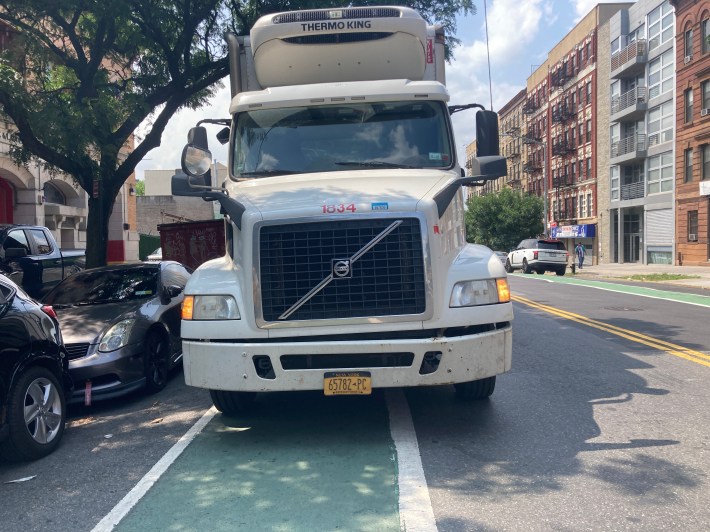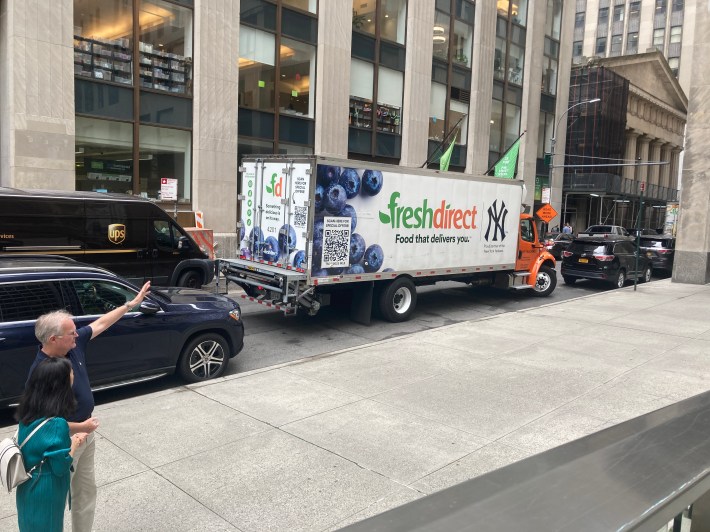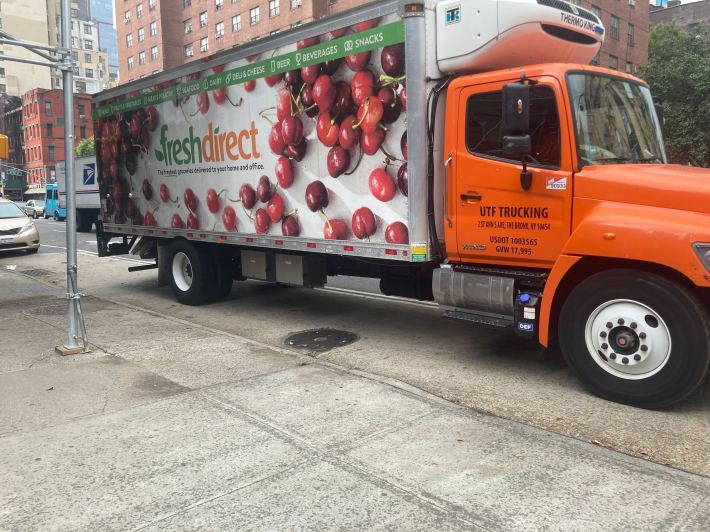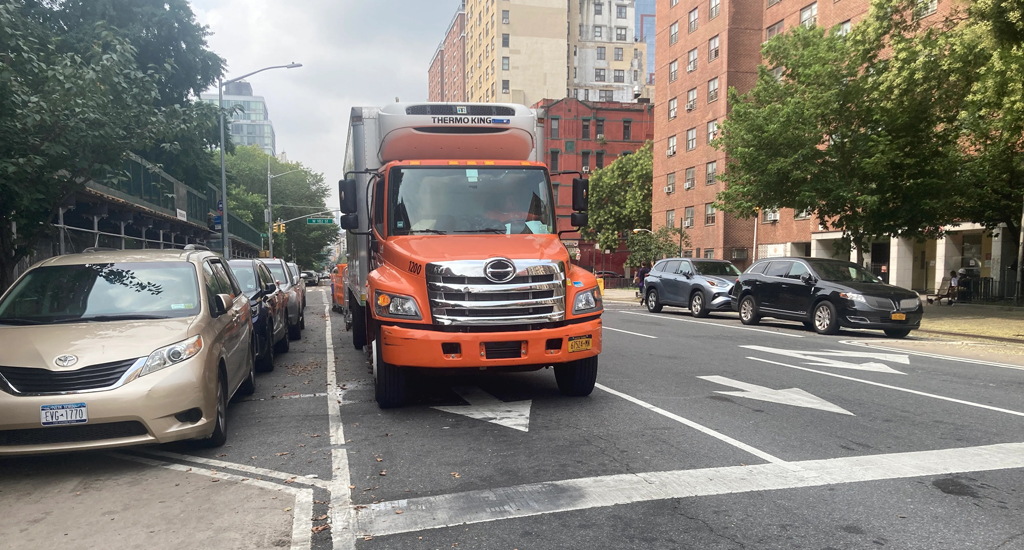Fresh-food-but-few-fines FreshDirect gets away with parking for pennies, I recently learned.
Who would've known that it's so easy to break the law while advertising your company? The double-parked demon of NYC — grocery delivery maven FreshDirect — is gifted at this skill.
In a previous piece, I uncovered the wrongdoings of Central Park's soft-serve scoundrels and the cowardly cops who refused to get them out of the way of cyclists and pedestrians. Despite my best attempts to report an ice cream truck blocking the Central Park West bike lane, NYPD officers declined to ticket the ice cold offender. They left and, inevitably, he returned.
A recent run-in with FreshDirect was no different: For the unbound minds of the FreshDirect logistics team, the determination to park knows no bounds. Any void in the streetscape that fits a truck is fair game. FreshDirect trucks across the city block active lanes of traffic, bike lanes, no-standing zones, fire hydrants, sidewalks, crosswalks, and everything in between — often managing to obstruct more than one of these things at once.
Not only was this @FreshDirect truck parked in both the Clinton Street bike lane and the sidewalk, its driver cut me off in order to do so. With 595 traffic violations, he was very apologetic - if a middle finger is @FreshDirect shorthand for "I'm sorry I cut in front of you." pic.twitter.com/1tBL0DtDpU
— BronxBikeGuy (@BikeBronx) September 19, 2021
As with the ice cream trucks, I wondered what would happen if I attempted to report the FreshDirect fleet, which has literally hundreds of designated staging areas across Manhattan.
I got a tip from a fellow West Sider that the company has taken over one of the three moving lanes on Amsterdam Avenue from 6:30 a.m. to 9 p.m. every day going back at least four years. Deciding to pay them a visit, I spotted the mobile warehouse a few blocks from the spot in question. A FreshDirect Truck sat in a marked lane of traffic alongside at least five push-carts for deliveries.
“There are two shifts,” one of the workers, who declined to give his name, told me. “One truck gets here at about 6:30 in the morning and does deliveries until about 11 or 12 and then waits in the spot until 2:30, when the next truck shows up and does deliveries until about 8 or 9. This happens every day, including the weekends.”
Most delivery companies in the city operate by making quick drop-offs where they may double park for 10 to 20 minutes. Double parking is never good, even for 20 minutes, but FreshDirect takes it to another level. The company parks its trucks at specific spots for hours at a time to serve as a base for runners with push carts to deliver groceries. These distribution centers sit about every 10 blocks in the residential areas on the East and West sides of Manhattan.


In the Amsterdam Avenue case, the truck ought to have been ticketed, as it had been double parked at the location for hours. I figured a 311 report might result in a quick ticket and the truck’s location.
I filed a report and waited. An hour later I received a notification: “Those who were responsible for the condition were gone.” The catch: In the time I’d sat watching the distribution center, no cops had shown up. Some patrol cars had passed by, and maybe one of them was tasked with my complaint, but the response was a lie — and a lazy one at that. FreshDirect illegally parks on the block so much that Google’s satellite imagery has captured the act.
Conveniently, the NYPD’s 24th Precinct was only two blocks away. I walked over and asked for assistance. Surprisingly, an officer at the door acknowledged my complaint and sent over another patrol car.
But cops did not ticket the truck when they arrived, instead instructing the driver to move onto a painted curb extension — transferring the brunt of FreshDirect’s disrespect of the rules of the road from drivers to pedestrians:

Unsure the entire saga had not been a fluke, I decided to test enforcement in the Financial District, where streets are narrow and a single illegally parked truck can bring traffic to a halt.
I repeated the process of filing a report, this time against another FreshDirect truck parked for several hours in a no-standing zone on Pine Street. Just like the last time, the ticket was closed before anyone from the NYPD appeared to assess the situation.
A nearby parking enforcement agent initially made it clear to me that she had no intention to ticket any of the 10 Vehicles long parked in the no-standing zone. I explained my lack of success with 311, and somehow she changed her mind. She walked over to the truck and slapped a $115 ticket on its windshield. It's hard to find lower Manhattan parking for that cheap!
Not that the cost of a ticket is an issue for FreshDirect, whose trucks are serial offenders for all types of parking violations as well as dangerous moving violations like speeding, according to the “How’s My Driving? NYC” database.
Search any random FreshDirect truck’s license plate on the database, and you’ll see a list of hundreds of violations and tens of thousands of dollars in fines. But consider that those fines are spread over many years — and that massive companies like FreshDirect can budget for parking tickets and receive discounts through the city’s Stipulated Fine Program, which gives companies a break on tickets if they don’t contest them.
Between 2008 and 2019, FreshDirect was charged $38,147,493 for tickets, but due to the Stipulated Fine program, it only ended up paying $22,761,886, according to data obtained by FOIL and shared with Streetsblog by a source. FreshDirect had years in that span where they pulled in over $600 million in revenue. Those parking tickets are a drop in the bucket, and the company does not give its drivers any way to pay the meter even when spots are free, one worker told me.
“They stopped giving us the cards to pay the meter two years ago; they didn't tell us why,” said the worker, who asked to remain anonymous.
I compiled a map using publicly available data, mapping out three FreshDirect truck parking violations. These were only the violations that took place during NYC's fiscal year 2023, which spanned from July 1st, 2022, to June 30th, 2023. These three trucks produced over 480 traffic violations over that stretch. But that means that these trucks were getting less than one ticket a day. Even if not used for deliveries every day, it seems like only 1.3 tickets per day for three trucks, or about 0.44 tickets per day per truck, is quite low. On top of that, because of their enrollment in the Stipulated fine program, their fines are further reduced, meaning that the few fines they face are further fractioned.
As one NYPD officer I spoke with told me, cops often choose not to ticket delivery trucks out of a sense of professional courtesy. But what makes this act courteous? Without enforcement, the only party that is given a courtesy is massive company whose executives deny any violations of traffic laws. All they’re doing is making us late.
FreshDirect did not return a request for comment.






